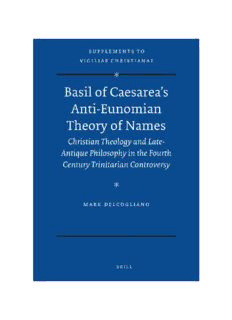
Basil of Caesarea’s Anti-Eunomian Theory of Names: Christian Theology and Late-Antique Philosophy in the Fourth Century Trinitarian Controversy PDF
Preview Basil of Caesarea’s Anti-Eunomian Theory of Names: Christian Theology and Late-Antique Philosophy in the Fourth Century Trinitarian Controversy
Basil of Caesarea’s Anti-Eunomian Theory of Names Supplements to Vigiliae Christianae Texts and Studies of Early Christian Life and Language Editors J. den Boeft – B. D. Ehrman – J. van Oort – D. T. Runia – C. Scholten – J. C. M. van Winden VOLUME 103 Basil of Caesarea’s Anti-Eunomian Theory of Names Christian Theology and Late-Antique Philosophy in the Fourth Century Trinitarian Controversy By Mark DelCogliano LEIDEN • BOSTON 2010 This book is printed on acid-free paper. Library of Congress Cataloging-in-Publication Data DelCogliano, Mark. Basil of Caesarea’s Anti-Eunomian theory of names : Christian theology and late-antique philosophy in the fourth century trinitarian controversy / by Mark DelCogliano. p. cm. — (Supplements to Vigiliae Christianae ; v. 103) Includes bibliographical references and index. ISBN 978-90-04-18332-2 (hardback : alk. paper) 1. Basil, Saint, Bishop of Caesarea, ca. 329–379. Contra Eunomium. 2. Eunomianism. 3. Trinity—History of doctrines— Early church, ca. 30–600. 4. Eunomius, Bp. of Cyzicus, ca. 335–ca. 394. I. Title. II. Series. BR65.B34C663 2010 273’.4—dc22 2010018940 ISSN 0920-623x ISBN 978 90 04 18332 2 Copyright 2010 by Koninklijke Brill NV, Leiden, The Netherlands. Koninklijke Brill NV incorporates the imprints Brill, Hotei Publishing, IDC Publishers, Martinus Nijhoff Publishers and VSP. All rights reserved. No part of this publication may be reproduced, translated, stored in a retrieval system, or transmitted in any form or by any means, electronic, mechanical, photocopying, recording or otherwise, without prior written permission from the publisher. Authorization to photocopy items for internal or personal use is granted by Koninklijke Brill NV provided that the appropriate fees are paid directly to The Copyright Clearance Center, 222 Rosewood Drive, Suite 910, Danvers, MA 01923, USA. Fees are subject to change. printed in the netherlands Steven K. Strange In memoriam τοῦτον ἐζήτουν (Porphyry, Vita Plotinii 3) Richard G. Levad In memoriam καὶ εἶδεν ὁ θεὸς ὅτι καλόν (Genesis 1:10) CONTENTS Acknowledgements ............................................................................ xi Abbreviations ..................................................................................... xiii Introduction ........................................................................................ 1 Historical setting ............................................................................ 3 Basil and Eunomius in recent scholarship ................................. 15 Plan of chapters .............................................................................. 20 Sense and reference ........................................................................ 21 A note on style, translations, and references ............................. 22 Chapter One The Heteroousians on Names and Naming ...... 25 I. The early Heteroousian theory of names ............................ 27 Aetius and the centrality of ‘unbegotten’ ........................ 28 Eunomius: an untraditional and illogical interpretation of ‘unbegotten’? .............................................................. 32 The Heteroousian theory of names and their theological epistemology .................................................................... 34 The centrality of divine simplicity ................................... 36 II. Eunomius’s theory of names: implications and inconsistencies ......................................................................... 38 Homonymy and synonymy ............................................... 38 Blurred distinctions ............................................................ 42 III. Eunomius on the origin of names ........................................ 43 Conclusion ....................................................................................... 47 Chapter Two The Heteroousians and Philosophical Theories of Names ......................................................................................... 49 I. The quest for the sources of Eunomius’s theory of names ....................................................................................... 51 II. The Platonist tradition: the Cratylus and its interpretation .......................................................................... 57 Plato’s Cratylus on names and naming .......................... 58 A Mesoplatonist theory: Alcinous .................................... 62 The Neoplatonist interpretation of the Cratylus ............ 65 Concluding remarks on Platonist influence on the Heteroousians ................................................................. 79 viii contents III. Mediated Platonism: Philo and Eusebius ........................... 79 Philo and the exegesis of Hebrew names ........................ 80 Eusebius of Caesarea and Platonist indebtedness to Moses ............................................................................... 87 Conclusion ....................................................................................... 92 Chapter Three The Heteroousian Theory of Names in its Christian Context .......................................................................... 97 I. The Christian tradition on ‘unbegotten’ as a name for God ..................................................................................... 98 Second-century Apologists ................................................. 99 Dionysius of Alexandria .................................................... 106 Early fourth-century Eusebians ........................................ 109 Early fourth-century debate over ‘unbegotten’ .............. 115 II. Athanasius and Eunomius .................................................... 124 Athanasius on name and nature ..................................... 124 Athanasius on divine simplicity and predication .......... 127 Conclusion ....................................................................................... 133 Chapter Four Basil’s Critiques of Eunomius’s Theory of Names .............................................................................................. 135 The incomprehensibility and ineffability of God’s substance ..................................................................................... 135 God is not a polyonym .................................................................. 140 Divine simplicity and predication ................................................ 144 The consequences of the Heteroousian epistemological principle ....................................................................................... 147 The convertibility of name and substance .................................. 150 Conclusion ....................................................................................... 151 Chapter Five Basil’s Notionalist Theory of Names ................... 153 I. Basic notions: the foundations of theology ......................... 155 Common or natural notions ............................................. 155 Common usage ................................................................... 158 II. Derived notions: Basil’s defense of conceptualization ....... 163 Stage one: the meaningfulness of conceptualizations .... 165 Stage two: conceptualization according to the common notion .............................................................................. 166 Stage three: the conceptualizations of Christ ................. 169 contents ix Stage four: the conceptualizations applied to God ........ 170 Basil’s use of Origen ........................................................... 171 III. Possible sources for Basil’s notionalist theory of names ................................................................................... 176 A Neoplatonist background for Basil’s notionalist theory of names? ............................................................ 177 The Homoiousian notions of ‘Father’ and ‘Son’ ............ 182 Conclusion ....................................................................................... 185 Chapter Six Basil on Names as Revelatory of Properties ........ 189 I. Proper names .......................................................................... 190 Basil’s theory of proper names ......................................... 191 The bundle theory of individuals ..................................... 196 The persistence of individuals ........................................... 203 Basil’s sources ..................................................................... 204 Concluding remarks on Basil’s theory of proper names .............................................................................. 211 II. Absolute names ....................................................................... 212 Basil’s grammatical description of absolute names ....... 212 Basil’s distinguishing marks and Porphyry’s propria .... 219 Concluding remarks on Basil’s understanding of absolute names ............................................................... 221 III. Relative names ........................................................................ 222 The Aristotelian understanding of relatives ................... 224 The grammatical understanding of relatives .................. 234 Basil of Caesarea on relative names ................................ 248 Concluding remarks on Basil’s theory of relative names .............................................................................. 253 IV. Derived names ........................................................................ 254 Conclusion ....................................................................................... 259 General Conclusion ........................................................................... 261 Bibliography ........................................................................................ 267 Index Locorum ................................................................................... 285 Index of Scripture .............................................................................. 291 General Index ..................................................................................... 293
Description: